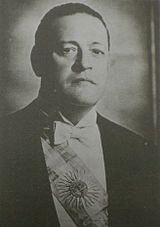Argentine presidential election, 1937
|
|
||||||||||||||||||||||||||||||||
|
||||||||||||||||||||||||||||||||
|
||||||||||||||||||||||||||||||||
|
||||||||||||||||||||||||||||||||
The Argentine presidential election of 1937 was held on 5 September 1937.
Agustín P. Justo
National Democratic Party
Roberto M. Ortiz
National Democratic Party
The 1931 elections (boycotted by the previous ruling party, the centrist Radical Civic Union) proved to be a precedent for the 1937 elections, called to replace outgoing President Agustín Justo. Justo had ruled as an enlightened despot, subordinating national policy to entrenched commercial interests and encouraging systemic fraud in gubernatorial and legislative polls held in 1935, while also promoting record public works spending. His administration initiated the nation's first paved intercity roads, Buenos Aires' massive Nueve de Julio Avenue, and the University of Buenos Aires School of Medicine, among other works. Even as it recovered from the great depression, however, Argentina's increasingly urban and industrialized social profile bode poorly for the ruling Concordance, an alliance dominated by the conservative, rural landowner-oriented National Autonomist Party (who held power from 1874 to 1916).
The movement which displaced them in 1916, the centrist, urban-oriented Radical Civic Union (UCR), turned to Marcelo Torcuato de Alvear for leadership following the military overthrow of its long-time leader and Alvear's rival, Hipólito Yrigoyen, in 1930. The scion of one of Argentina's traditional landed families and President from 1922 to 1928 (when his alliance with Yrigoyen soured), Alvear was respected largely for challenging Yrigoyen's personality cult (hence his reputation as the leading "Antipersonalist") and for his decision to boycott the 1931 election, given its uneven playing field.
...
Wikipedia


